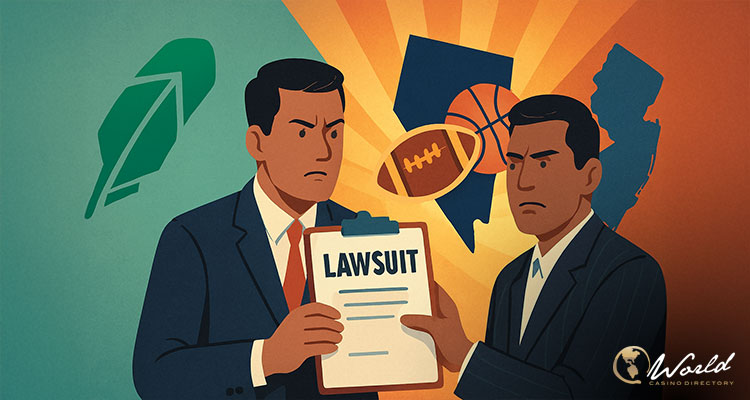Robinhood Derivatives, the derivatives arm of trading platform Robinhood, has launched legal action against gaming regulators in Nevada and New Jersey. The company is asking the courts to block both states from pursuing potential enforcement measures tied to its sports event contracts.
In lawsuits filed Tuesday, Robinhood argued that it had entered the event contracts market only after federal courts earlier this year sided with prediction market Kalshi, ruling that Nevada and New Jersey regulators could not prohibit Kalshi from offering such contracts. Robinhood maintains that since those judgments protect Kalshi under federal law, the same standard should apply to its own offerings.
Despite those federal decisions, Robinhood claims both states’ gaming officials have continued to resist, threatening penalties if the company proceeded with its contracts. That prompted the platform to file parallel complaints against the states and their attorneys general, contending that regulators’ refusal to comply with court rulings has left Robinhood vulnerable to “immediate threat of civil penalties and criminal prosecution.”
Uneven Playing Field Alleged
Robinhood says the dispute boils down to fairness in the marketplace, according to Cointelegraph. Event contracts, which allow users to speculate on the outcome of sporting events, elections, or other real-world scenarios, are regulated at the federal level by the Commodity Futures Trading Commission (CFTC).
The company insists that if Nevada and New Jersey are allowed to penalize it while leaving Kalshi free to operate, that imbalance would hand a competitive advantage to its rival. As its filing states, “If state regulators are permitted to act against Robinhood but not Kalshi, then Robinhood will lose out in the sports event contracts space.”
In both suits, Robinhood requested that the courts issue injunctions to prevent regulators from pursuing enforcement. It also sought temporary restraining orders that would shield its business while the lawsuits move forward.
Disputes with New Jersey and Nevada Regulators
Robinhood’s complaints detail specific confrontations in both states. In New Jersey, the company said it reached out to the Division of Gaming Enforcement to clarify that the federal court’s decision protecting Kalshi should also extend to its own contracts. According to the filing, “Division officials informed Robinhood that they could not agree to refrain from enforcement action even while this Court’s order was in place concerning Kalshi.” Robinhood added that officials did not respond to repeated follow-up requests for meetings.
A similar standoff unfolded in Nevada. The company claims that even after a federal court there backed Kalshi, the Nevada Gaming Control Board warned Robinhood it would treat any contracts offered in the state as “willful violations” of the law. Robinhood said regulators also turned down its proposal to temporarily allow its customers access to the same contracts offered by Kalshi.
A Growing Market Under Scrutiny
Robinhood has been steadily expanding its footprint in the prediction markets space. Its event contracts trade through KalshiEx, a CFTC-regulated designated contract market. The company recently broadened its prediction market hub to include both professional and college football, in addition to markets tied to cryptocurrencies, economic indicators, cultural events, and other sports. Since launch, Robinhood has reported more than two billion contracts traded.
Industry observers note that much of the prediction market activity remains concentrated offshore, with platforms such as Polymarket claiming to exclude U.S. participants. By contrast, Robinhood and Kalshi seek to build regulated alternatives under U.S. oversight.
Still, the disputes in Nevada and New Jersey illustrate the ongoing friction between state-level gaming authorities and federally regulated derivatives platforms. Robinhood’s filings emphasize that “if states could regulate some but not all entities relevant to these transactions, such regulation would infringe on the CFTC’s exclusive jurisdiction and fracture what Congress intended to be a uniform set of regulations for commodity futures and swaps trading.”
As both lawsuits progress, Robinhood’s ability to compete in the event contracts space may hinge on whether the courts extend the same protections already afforded to Kalshi. For now, the company says it has been left with no choice but to litigate in order to safeguard both its customers and its business model.
Statement from Robinhood Spokesperson
“Our event contracts, including those for pro and college football, are offered in a compliant, federally regulated way through our CFTC registered Futures Commission Merchant, Robinhood Derivatives. This is a decisive step forward in our mission to democratize finance for all and unlock even more innovative market opportunities for investors.” – Robinhood Spokesperson



